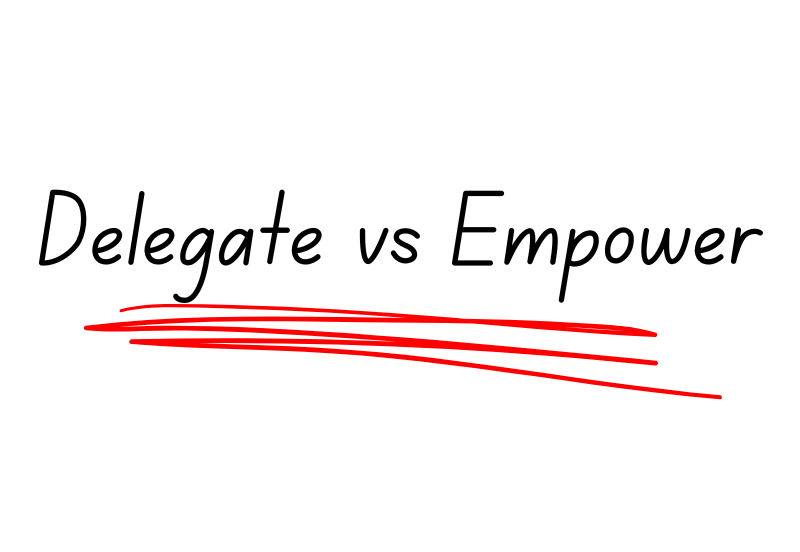Before we dive into these two managerial buzz words, let’s deal with some reality. Words are powerful. Lawyers know this. Anyone who’s ever signed a contract only to get kicked in the teeth over the words later knows this. Both of these concepts if employed correctly can have meaningful impact on a business leader’s day. Read from mindset of how these tools can save you time and efficiency.
Delegating
Delegating is passing off your to do list to an employee or VA who can do basic or intermediate functions. These tasks tend to take time away from the business owner from focusing on larger business matters.
Delegating is awesome for new businesses owners and new leaders. It helps them learn how to review and oversee without being involved in the execution and completion of the tasks. Additionally, a new owner or leader will learn, if they are willing, how to communicate their ideas effectively and how to manage a person or team.
While delegating can help the new business owner or leader become a better one, it will not grow a successful business. Delegating will not enable a business to experience rapid growth.
Finally, delegating is the favorite word of leaders who micromanage their team. They use it to sound like they have good leadership qualities but the reality is much different. They still operate from a place of fear and insecurity. I hear you, “But if I don’t do it, then I don’t know if it will be done correctly.” Or stated more accurately, “It’s my idea or no idea.” Leaders who micromanage at the core are insecure.

Sadly, this internal insecurity reflects externally with their inability to hire the best people and train others. Since they are unable to train their employees, they also do not share their expertise causing stagnation in institutional knowledge. This stagnation reveals a single point of failure for any business.
Micromanagers also drastically reduce efficiency and cost business real money through the demoralization of their team. This quality should be identified quickly, addressed or removed from the company. As a reformed micromanager, I know what I am talking about.
Empower
One of the best examples of a company who does this right is the shoe brand Zumiez.
Years ago, they decided they didn’t need a bunch of middle managers in order to oversee customer care agents. So, they got rid of them. They charged the customer service agents with one thing: Solve The Customers’ Problem. They empowered them to do whatever they needed to solve the customer issue.
The result was they have turned customers into raving fans!
They tell their agents to do everything they can to say “Yes.” This is such a brilliant strategy for many reasons. First, it removes roadblocks between a solution and the customer. I am a huge advocate for finding efficiencies in businesses and this is a big one.
Second, it challenges the customer service agent to be responsible for the outcome. There is no place to escalate the issue or pass the customer off to someone else. This builds a sense of responsibility and ownership.
The final and incredibly powerful thing they do well is have a central location with a complete customer history or written, phone, and purchase history. I also advise my clients to have some form of this so, no matter who picks up the phone in the company, the customer is understood. Additionally, it creates a predictable experience for the customer every time they contact the business. Finally, this establishes a sense of comfort and belonging for a customer.
A business owner or leader can use empowerment to get out of the decision making process and fire firefighting business and trust it to someone else. This is a big step in moving from a small business mindset set to big business execution.

An example of how to do it wrong.
I enjoy working with startups and entrepreneurs. One of these groups had an unstoppable drive to grow. They were unafraid to try ideas and move on when they were not working. Since I was handling business management and recruiting, I was charged with growing the team.
One major mistake I see in small to medium-sized businesses is hiring people who do not share the same values or understand the fast paced and chaotic nature of rapidly growing businesses.
Someone who is an Executive or Director at a large business who was very successful is the worst fit for a small to medium-sized fast-growing company.
The number one reason is they have been far removed for far too long, from putting in maximum effort and hands on work necessary for success. Instead, they have overseen teams who did the hands-on work and then sent the reports up the chain of command. This is the number one failure I see companies make in their hiring.
Here’s a tip: In the interview if you hear a lot of “we did this” or “yeah we did that”, the WE means the person in front of you didn’t do any of it.
The second problem is they will not get the work done and stay on pace with the rest of the company. They will instead lean on other people to do the job they were hired to do. Additionally, if you take someone who is used to the structure of a stable business and give them complete freedom, they do not know what to do with it. At best they will be scattered and overworked. At worst they will grow an ego and do whatever they want and destroy morale and culture along the way.

Usually, these bad hires play out over the course of a year or two before the business realizes the mistake. The cost of time, salary, and business inefficiency is real and impactful on the bottom line.
So, what do you do? Find candidates who have experience in your size level or are slightly bigger. Better yet, candidates who have grown startups from scratch to millions in revenue.
Final thoughts
If you have a manager or director who is unable to delegate, you need to fire them. They will never learn, and they will never empower their team. They will hold your business back.
If you have a fast-growing business and are excellent at empowering people then make sure you onboard them well. Train them in how to think and embody your values and mission. This way when they make a questionable decision you can always bring it back to the company values. And yes, they will interpret them in many unique ways which you never intended. That’s ok. This is how businesses grow.

